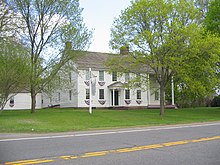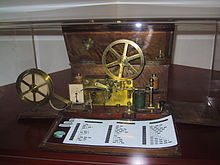Henry Leavitt Ellsworth
Henry Leavitt Ellsworth (born November 10, 1791 in Windsor , Hartford County , Connecticut , † December 27, 1858 in New Haven , Connecticut) was an American lawyer . He was the first head of the American patent office, president of the insurance company Aetna and founder of the later United States Department of Agriculture .
Life
Ellsworth was born in Windsor to Oliver Ellsworth and Abigail Wolcott. He graduated from Yale University and then went on to study law at Litchfield University.
After graduating, he settled first in Windsor and later in Hartford , where he lived for ten years. On June 22, 1813, he married Nancy Allen Goodrich (daughter of Congressman, Judge, and former Mayor of New Haven Elizur Goodrich ), with whom he had three children. In his second marriage, Ellsworth married Marietta Mariana Bartlett and later Catherine Smith. He received his middle name in memory of his grandmother's family.
In 1811 Ellensworth made his first trip to the western United States. First he rode to the Connecticut Western Reserve where his father Oliver Ellsworth bought 170 km² of land. Ellensworth wrote a short travelogue about this trip entitled "A Journey to New Connecticut in 1811". It was an arduous journey, during which Ellsworth could enjoy intoxicating views, but also had to deal with rioters. The rigors of the trip were eased by a meeting with Margaret Dwight. Ellsworth wrote: "Today I met my good friend Margaret Dwight. I spent a few pleasant hours with her." Dwight himself also wrote a travelogue entitled "A Trip to Ohio in 1810".
Twenty years later, in 1832, Ellsworth traveled west again, this time as the government agent for the Indian tribes in Arkansas and Oklahoma . President Andrew Jackson appointed him as a commissioner to "explore the land, measure the borders, bring peace to the Indians, and, more generally, establish law and order." Ellsworth traveled to Fort Gibson . On the way he stopped in Cincinnati and Louisville and then traveled on to St. Louis , Missouri . There he met the explorer William Clark and the chief of the Sauk Indians Black Hawk . His mission was difficult. He was supposed to mediate between the interests of various Indian tribes, which were pushed into ever smaller reservations by white settlers, and those of the Chouteau family , a powerful fur-trading dynasty. Ellsworth was accompanied on this trip by the author Washington Irving , the English climber, author and later governor of Victoria Charles La Trobe and Albert von Pourtalès .
In 1835 Ellsworth was elected Mayor of Hartford. However, he only held the office for a month before he was named first head of the U.S. Patent Office. He held this office until 1845. On his first day at the patent office, Ellsworth found that the inventions submitted for registration were piled up in what was supposed to be his office. Up to this point there was also no list of the patent owners, but this soon changed under Ellsworth.
As head of the patent office, Ellsworth made a decision that would affect the future of the entire state of Connecticut. The young Samuel Colt was looking for investors to build his newly invented revolver. It aroused the interest of Ellsworth, who in 1836 issued Colt the patent with the number 138. With this it was possible for the inventor to raise $ 200,000. With this capital, Colt founded the Patent Arms Manufacturing Company, a forerunner of today's Colt Defense Company .
Ellsworth was very interested in technology and ahead of his time. For example, he became aware of the telegraph invented by Samuel Morse and asked Congress for $ 30,000 to test the possibilities of using the device.
After his time in the patent office, he settled in Lafayett , where he worked as a broker. In 1857, however, he returned to Connecticut.
Ellsworth died on December 27, 1858 in New Haven, Connecticut. After his death, most of his records were given to the Yale University library. They are kept there as a separate collection to this day.
Individual evidence
- ^ Biographical Sketches of the Graduates of Yale College, Franklin Bowditch Dexter, Yale University Press, New Haven, 1912
- ↑ Litchfield Law School Students, Litchfield Historical Society, litchfieldhistoricalsociety.org ( Memento of the original of June 8, 2012 in the Internet Archive ) Info: The archive link was automatically inserted and not yet checked. Please check the original and archive link according to the instructions and then remove this notice.
- ^ The History of the Descendants of John Dwight, of Dedham, Mass., Benjamin Woodbridge Dwight, New York, 1874
- ↑ Margaret Dwight's manuscript was edited by Max Farrand and published in 1912 as Volume I of the Yale Historical Manuscripts series.
- ↑ Ellsworth wrote a book about this, entitled "Washington Irving on the Prairie, or: A Tale of a Journey to the Southwest in 1832."
- ^ Text of the Indian Removal Act of 1830.
- ^ Aristocratic Encounters: European Travelers and North American Indians, Harry Liebersohn, Cambridge University Press, 1998
- ↑ The Journal of the Union Mission, Hope Holway, University of Oklahoma (PDF; 1.4 MB)
- ↑ Gunmaker to the World, Ellsavorth S. Grant, American Heritage Magazine, June 1968, on americanheritage.com ( Memento of the original from September 5, 2008 in the Internet Archive ) Info: The archive link was automatically inserted and not yet checked. Please check the original and archive link according to the instructions and then remove this notice.
- ↑ The History of the US Patent Office on patentmodelassociation.com
literature
- Henry Leavitt Ellsworth, Phillip R. Shriver (Eds.): A Tour to New Connecticut in 1811: The Narrative of Henry Leavitt Ellsworth . With an introduction by Phillip R. Shriver (= Western Reserve history studies series . Vol. 1). Western Reserve Historical Society, Cleveland, Ohio 1985, ISBN 0-911704-32-9 (141 pages).
- Henry Leavitt Ellsworth: Washington Irving on the prairie; or, A narrative of a tour of the Southwest in the year 1832 . Other title: Tour of the Southwest in the year 1832. Ed .: Stanley T. Williams, Barbara D. Simison. American book company, New York 1937, LCCN 37-037571 , OCLC 755268 (152 pp.).
Web links
- Henry Leavitt Ellsworth pictured in the Archives of the New York Public Library Digital Gallery
- Henry Leavitt Ellsworth, National Agricultural Hall of Fame
- Guide to Henry Leavitt Ellsworth's Records at Yale University Library
- "500 Farmers Wanted" poster dated April 29, 1847 for sale of land by the brokerage office of Henry Leavitt Ellsworth, Lafayette, Indiana on Connecticut History Online
| personal data | |
|---|---|
| SURNAME | Ellsworth, Henry Leavitt |
| BRIEF DESCRIPTION | American lawyer |
| DATE OF BIRTH | November 10, 1791 |
| PLACE OF BIRTH | Windsor , Connecticut |
| DATE OF DEATH | December 27, 1858 |
| Place of death | New Haven |


